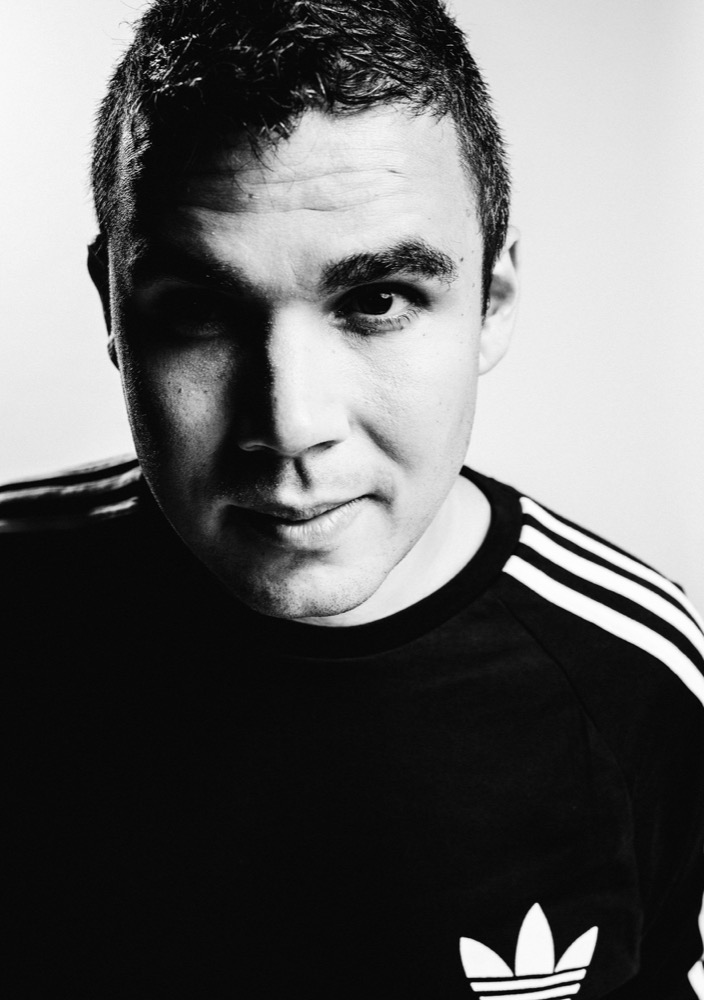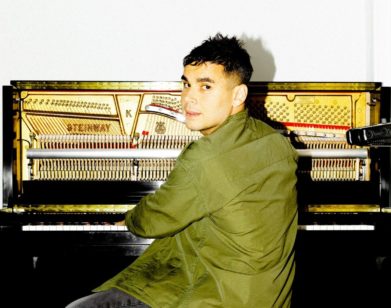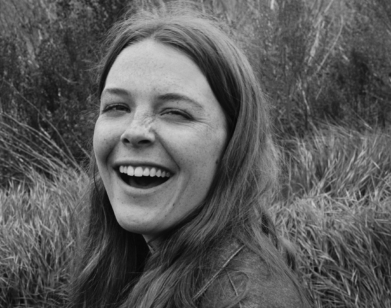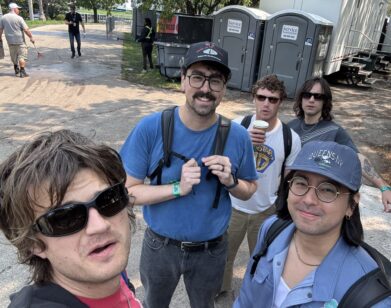Rostam Batmanglij is striking out on his own
When New York pop rockers Vampire Weekend released their debut single “Mansard Roof” in 2007, they’d been a band for just a few months. It was the height of the city’s brooding alt-rock buzzfest, and Vampire Weekend sounded nothing like any of their peers. Their songs were bouncy and baroque, and they called to mind the synthy ‘80s Afropop of artists like Paul Simon and David Byrne. Before long, bandmates Ezra Koenig, Rostam Batmanglij, Chris Baio, and Chris Tomson found themselves heralded as indie’s new poster boys and began touring the world.
Looking back now, it’s hard not to compare the slow-burning rollout of Batmanglij’s solo debut to the quick ascent of his alma mater. “Wood,” the first single off of Half-Light (out this Friday on Nonesuch Records), appeared on his SoundCloud all the way back in 2011. At the time, most fans considered the song to be a one-off. It’s loping, Eastern-inspired suite of strings, tambourine, and hushed vocals sounding like a mix between Vampire Weekend and Batmanlij’s other, more electro-heavy outfit, Discovery. In between then and now, Batmanglij released a few more singles (2011’s “Don’t Let It Get To You”; 2016’s “EOS”). He also left New York for Los Angeles, amicably departed from Vampire Weekend, made a collaborative album with the Walkman’s Hamilton Leithauser (2016’s I Had A Dream That You Were Mine), and co-wrote and produced a wide range of music, including songs for Frank Ocean, Solange, Charli XCX, Carly Rae Jepsen, Haim, and Santigold. All the while his solo album sat on the backburner, in various stages of completion.
Six years in the making, Half-Light is filled with lush details: closely mic’d vocals, picturesque scene-setting, weightless swells of strings, and electronic textures. It’s joyous and catchy, intimate and spacious, and, like its creator, exists in a musical world all its own.
ALY COMINGORE: Let’s start at the beginning. You grew up in Washington, D.C.?
ROSTAM BATMANGLIJ: I did. My parents left Iran in 1979 and moved to France and then moved to the U.S. My brother was born in France and I was born in New York, and then we moved to D.C. I think my parents left France because they felt their kids would never be accepted by French culture. Here they thought we could feel American—that we could feel safe in that way—which was important to them, given what their experiences were in Iran. They used to joke about how I could be president because I was the only one born in America.
COMINGORE: Were you a pretty outgoing kid?
BATMANGLIJ: I would say I was a little bit outgoing, a little bit shy. I was definitely much more shy than my brother. [Laughs]
COMINGORE: When did you start playing music?
BATMANGLIJ: I was young—age six. I was really drawn to it because my brother started playing instruments and I wanted to be at his level, even though I was younger. I took one piano lesson and hated it and then didn’t take any piano lessons until I was 18. I did take guitar lessons as a teenager, though, and I started to teach myself how to play everything I could play on the guitar on piano, so I had a really weird, non-traditional route to proficiency. I think it probably helped me come at things from a new angle.
COMINGORE: Do you remember the first song you learned to play?
BATMANGLIJ: I was lucky to have a guitar teacher who asked me what I wanted to learn. I brought in “High & Dry” by Radiohead and “Mr. Jones” by Counting Crows and he was like, “Alright, I’m gonna teach you these, but you’re also gonna learn some stuff that I want you to learn.” He taught me Jimi Hendrix and Eric Clapton, so I was getting the technical stuff and the fun stuff. But then at some point I decided I didn’t want to learn any more guitar technique. I was at that level where the next mountain there was to climb was Van Halen and I didn’t really like Van Halen.
COMINGORE: When do you feel like you started to find your voice musically?
BATMANGLIJ: I made a quote-unquote “album” for my senior project of high school. As soon as I finished making it I realized it wasn’t the kind of music I wanted to make. I remember playing it for some people and being technically impressed by how it sounded, but at the same time I didn’t want to listen to it because it didn’t feel very honest. It took me some time to join the various streams of making music that was technically good and making music that made me feel good.
COMINGORE: Where did Vampire Weekend fit into that self-discovery process?
BATMANGLIJ: Throughout college I was getting better and better at making recordings, producing songs, making different kinds of beats. I was starting to learn the signifiers of production from the ‘60s, the ‘80s. By the time Vampire Weekend started in 2006 I had proven that I had that knowledge, and Ezra [Koenig] trusted me to produce the band recordings. What might surprise some people is that we started recording the album within a couple of months of being a band, and the songs we made were the ones that ended up being on the first album. We never re-recorded anything. All the record companies that wanted to sign us—except for one—were excited about the recordings that we had done ourselves.
COMINGORE: Did you always know you wanted to put out a solo album?
BATMANGLIJ: I’d be lying if I said there weren’t moments when it crossed my mind. I had these recordings that I kept picking up and putting down that were in various stages of completion. I think eventually there were just enough moments to push me towards crossing the finish line. In the fall of 2014 I went to see Julian Casablancas + The Voidz play. I remember Julian asking me when I was going to get in front of the mic. He was really encouraging me [to sing]. What he said sunk in the next day, and after that I started to block out a week at a time to work on the record.
COMINGORE: Did you have themes or touchstones in mind when you started working?
BATMANGLIJ: This album was very much the genesis of wanting to make an album where every song blurred the line between what was a string arrangement and what was a song. That definitely evolved and changed over time, but that was the concept I started with. I wanted to make an album where every song is kind of interacting—where you can’t tell what’s the string arrangement and what’s the song. I guess that came out of going to college, majoring in music, studying classical music, and even as a kid, being really drawn to classical music.
COMINGORE: What does “half-light” mean to you?
BATMANGLIJ: It’s funny because the song was written and I’d used that word, I’d named the song that word, and it wasn’t until I thought about using it for the album title that I really looked up what it meant. It turns out it means a lot of things. It means dawn and dusk; it means sunset and sunrise. Those times of day are connected with things that I think are important to the record, like sex or relationships or realizations about life. I liked that I could touch on all of those things by referring to a time of day.
COMINGORE: Is there a particular story behind “Don’t Let It Get To You”?
BATMANGLIJ: As far as the lyrics go, I think I was negotiating a moment in my life where I didn’t feel happy. I think I had some existential frustration and I was wrestling with that on a few different levels. I was feeling like I wanted to change a lot of things. I like the idea that a song can be about a romantic relationship, but it can also about a relationship to your career, or a relationship to your city. It can be about a person, but at the same time it can be about a situation.
COMINGORE: While you working on this album you also did the collaboration with Hamilton Leithauser, you produced the Haim record, you worked on the Frank Ocean album. How did those experiences filter into your own work?
BATMANGLIJ: I remember having a conversation with Frank where he was talking about working on one song for four days straight and not sleeping. In talking to him I realized that I had been afraid to really throw myself into it. I had no problem working for 15 hours straight when I was producing someone else, but I couldn’t do it with my own songs. It took that moment of pointing the camera at myself to realize that it was okay to get lost in making my own music. I think before that I was scared of pushing myself to the point of staring into the abyss.
COMINGORE: Do you feel like you did it?
BATMANGLIJ: I had to. In order to finish this album, I had to make it the only thing that was important to me for a bit. And obviously it always takes longer to finish an album than you think it will. That’s always going to be the case. Everything takes longer than you think it will. Occasionally things happen fast.
COMINGORE: How do you know when a song is done?
BATMANGLIJ: There’s a part of you that can never know, but you have to finish it or else nobody gets to hear it [laughs]. There’s a line in the Arthur Russell documentary where his partner talks about how Arthur is really interested in process. He never felt like anything was finished, and he would even work on things after they’d been released. I definitely relate to that.
COMINGORE: So, now that it’s out, where is the ideal place to listen to Half-Light?
BATMANGLIJ: Wherever sun is rising or setting; in New York it would be on headphones in the subway, in California it would be anywhere on Pacific Coast Highway.
COMINGORE: What do you hope people remember you for?
BATMANGLIJ: Fearlessness.
COMINGORE: What’s your most prized possession?
BATMANGLIJ: An upright piano that I bought in England. It’s not very expensive, but I think it’s hard to find now. They used to have them at Abbey Road, but it wasn’t the piano that they had mic’d up in the studio, it was the one they had in the hall, or in the lounge. There’s rumors that Paul McCartney wrote songs on it, but I don’t know.
HALF-LIGHT IS OUT ON FRIDAY, SEPTEMBER 15, 2017 ON NONESUCH.







